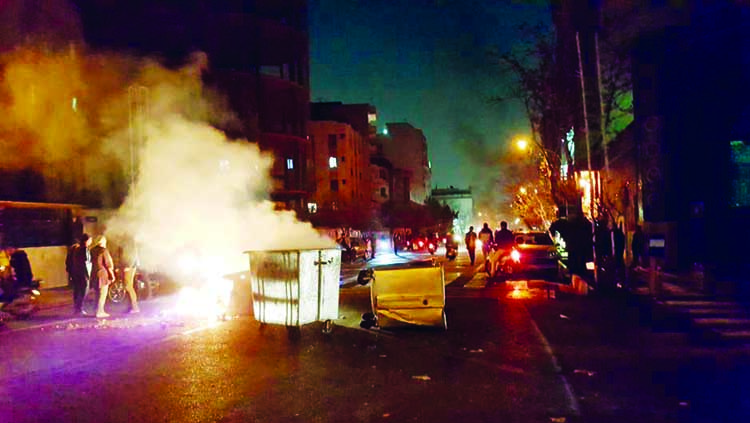
Twelve people have been killed overnight in anti-government protests sweeping Iran, according to state TV.
“In the events of last night, unfortunately a total of about 12 people were killed in several cities,” it said. At least 12 people have now died since protests began on Thursday.
On Monday, President Hassan Rouhani said the protests and criticism were an opportunity, not a threat.
He said the country should work together to fix its economic problems.
He said: “Our nation will deal with this minority who chant slogans against the law and people’s wishes, and insult the sanctities and values of the revolution.”
He previously said that citizens were free to protest, but not violently.
Nevertheless, protests continued overnight. Police used tear gas and water cannon to quell a rally in Tehran’s Engheleb Square and demonstrations were reported in Kermanshah and Khorramabad in the west, Shahinshahr in the north west and the northern city of Zanjan. The demonstrations, which erupted on Thursday in Iran’s second city of Mashhad, are the biggest show of dissent seen since the huge rallies of the Green Movement were brutally suppressed in 2009.
Judiciary Chief Ayatollah Sadeq Amoli-Larijani called for a crackdown on “rioters” and “vandals” on Monday, according to state television. “Some individuals are exploiting the situation. This is wrong,” he said.
State TV said armed protesters had tried to take over some police stations and military bases, but faced serious resistance from security forces. Mr Rouhani has acknowledged popular grievances, though he warned that the government would show “no tolerance for those who damage public properties, violate public order and create unrest in the society”.
And Iran’s Revolutionary Guards Corps (IRGC) has warned anti-government protesters they will face the nation’s “iron fist” if political unrest continues. The IRGC is a powerful force with ties to the country’s supreme leader, and is dedicated to preserving the country’s Islamic system. Correspondents say it would be a significant escalation were they to become officially involved in policing the protests.
Up to 400 people are reported to have been arrested in recent days, including 200 in Tehran on Saturday night.
And authorities continue to sporadically suspend social media websites they fear will be used to organise protests, including Telegram and Instagram.
State media have now begun broadcasting some footage on the protests, though focuses on young men attacking banks and vehicles or burning the Iranian flag, reported AFP news agency.
On Sunday police used water cannon to disperse protesters at a major intersection, as captured in a video obtained by BBC Persian. There is widespread and seething discontent in Iran where repression is pervasive and economic hardship is getting worse – one BBC Persian investigation has found that on average Iranians have become 15% poorer in the past 10 years.
Protests have remained confined to relatively small pockets of mostly young male demonstrators who are demanding the overthrow of the clerical regime.
They have spread to small towns throughout the country and have the potential to grow in size.
But there is no obvious leadership. Opposition figures have long been silenced or sent into exile.
Some protesters have been calling for the return of the monarchy and the former shah’s son, Reza Pahlavi, who lives in exile in the United States, has issued a statement supporting the demonstrations. But there are signs that he is as much in the dark about where these protests are going as anyone else.
BBC Persian, which broadcasts on TV, on radio and online from London, is banned in Iran – where staff and their families routinely face harassment and questioning from the authorities.
Mr Rouhani described the US president as an “enemy of the Iranian nation from the top of his head to his very toes” after Mr Trump said Iranians were “finally getting wise as to how their money and wealth is being stolen and squandered on terrorism”. And late on 31 December, Mr Trump tweeted more criticism of events in Iran.
Mass demonstrations – referred to as the Green Movement – were held by millions of opposition supporters against the disputed election victory of incumbent president Mahmoud Ahmadinejad.
At least 30 people were killed and thousands arrested in the wave of protests, which drew the largest crowds in Iran since the Islamic Revolution in 1979.

